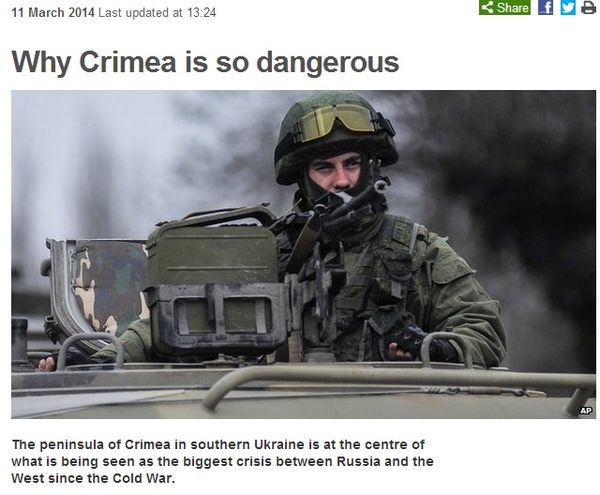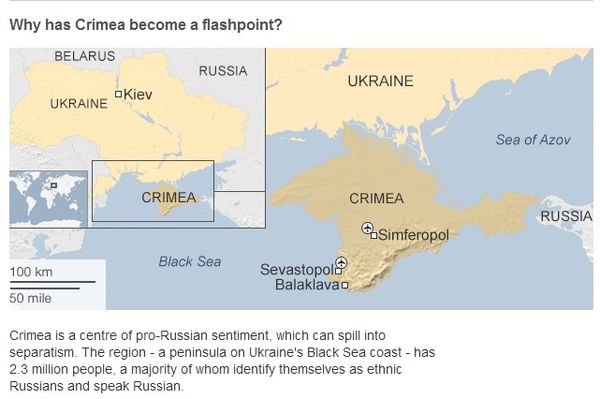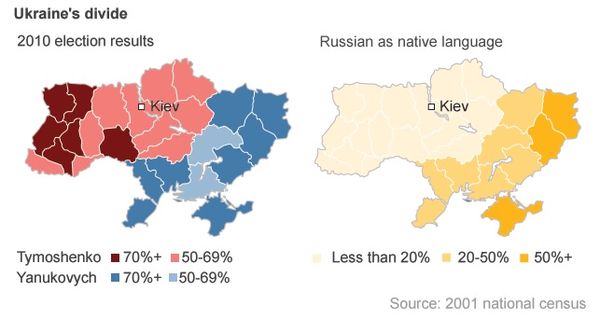克里米亞是誰的?
公元1783年, 前俄羅斯女皇凱瑟琳打敗鄂圖曼帝國而奪得克里米亞半島, 打通俄羅斯通往黑海和地中海之路。從此俄羅斯在克里米亞半島駐軍並建立黑海艦隊, 直到今天。
1954年, 前蘇聯領導人赫魯曉夫把克里米亞半島劃入當時同屬蘇聯的烏克蘭, 以支持貧困的烏克蘭走上工業化之路。
蘇聯解體, 烏克蘭獨立之後, 理應物歸原主, 把克里米亞半島交還俄羅斯, 而不是據為己有。
國際上的事情錯綜複雜, 是非難定, 真理靠實力來判斷。
貧困的烏克蘭還要靠俄羅斯接濟才能生存, Crimea 是掉定的, 毫無轉寰餘地。
Troops loyal to Russia have taken control of the region and the pro-Russian parliament has voted to join the Russian Federation, to be confirmed in a referendum.
The region voted heavily for Viktor Yanukovych in the 2010 presidential election, and many people there believe he is the victim of a coup - prompting separatists in Crimea's parliament to vote for joining the Russian Federation and a referendum on secession.
Is Crimea truly Ukrainian?
Watch a short history of the Republic of Crimea
Russia has been the dominant power in Crimea for most of the past 200 years, since it annexed the region in 1783. But it was transferred by Moscow to Ukraine - then part of the Soviet union - in 1954. Some ethnic Russians see that as a historical wrong.
However, another significant minority, the Muslim Crimean Tatars, point out that they were once the majority in Crimea, and were deported in large numbers by Soviet leader Joseph Stalin in 1944 for alleged collaboration with Nazi invaders in World War Two.
Ethnic Ukrainians made up 24% of the population in Crimea according to the 2001 census, compared with 58% Russians and 12% Tatars.
Tatars have been returning since the collapse of the Soviet union in 1991 - causing persistent tensions with Russians over land rights.
he Republic of Crimea, officially part of Ukraine, lies on a peninsula stretching out from the south of Ukraine between the Black Sea and the Sea of Azov. It is separated from Russia to the east by the narrow Kerch Strait.
In early 2014 Crimea became the focus of the worst East-West crisis since the Cold War, after Ukraine's pro-Moscow president Viktor Yanukovych was driven from power by violent protests in Kiev.
Kremlin-backed forces seized control of the Crimean peninsula, and the territory, which has a Russian-speaking majority, voted to join Russia in a referendum that Ukraine and the West deem illegal.
Crimea was annexed by the Russian Empire during the reign of Catherine The Great in 1783 and remained part of Russia until 1954, when it was transferred to Ukraine under the then Soviet leader Nikita Khrushchev.
Ethnic Russians make up the majority of the population, but with significant Ukrainian and Crimean Tatar minorities.
Under Greek and Roman influence for centuries, in 1443 Crimea became the centre of a Tatar Khanate, which later fell under Ottoman control.
Rival imperial ambitions in the mid 19th century led to the Crimean War when Britain and France, suspicious of Russian ambitions in the Balkans as the Ottoman Empire declined, sent troops.
Given autonomous republic status within Russia after the Bolshevik revolution, Crimea was occupied by the Nazis in the early 1940s.
Tatar deportation
Stalin accused the Tatars of collaborating with the German occupiers and deported them en masse to Central Asia and Siberia in 1944. Many did not survive.
Only as the Soviet union collapsed were they allowed to return. By the time over a quarter of a million did so in the early 1990s, it was to an independent Ukraine where they faced very high unemployment and extremely poor housing conditions.
There were persistent tensions and protests over land rights, and allocation of land to Crimean Tatars was a contentious issue.
After Ukrainian independence, political figures from the local Russian community sought to assert sovereignty and strengthen ties with Russia through a series of moves de clared unconstitutional by the Ukrainian government.
The 1996 Ukrainian constitution stipulated that Crimea would have autonomous republic status, but insisted that Crimean legislation must be in keeping with that of Ukraine.
Crimea has its own parliament and government with powers over agriculture, public infrastructure and tourism.
The Crimean Tatars have their own unofficial parliament, the Mejlis, which states its purpose as being to promote the rights and interests of the Crimean Tatars.
Ukraine-Russia tension
The port of Sevastopol is a major naval base and has been home to the Black Sea Fleet since Soviet times. Following the collapse of the USSR, the fleet was divided up between Russia and Ukraine.
The continuing presence of the Russian fleet in Sevastopol has been a focus of tension between Russia and Ukraine. In 2008, Ukraine - then under the pro-Western President Viktor Yushchenko - demanded that Moscow not use the Black Sea Fleet during the its conflict with Georgia.
Both countries had agreed to allow the Russian fleet to stay until 2017, but after the election of the pro-Russian Viktor Yanukovych as president in 2010, Ukraine agreed to extend the lease by 25 years beyond 2017, in return for cheaper Russian gas.
Source from : www.bbc.com




祝你年年精彩
[原創]年年精彩 調寄:樂瞳(微笑的魚)
年年精彩 點擊收看:微笑的魚
作曲:SAMANTHA@IMAGINES
作詞:LITTLELADY
期望每位亦有福氣常盛載
人人也開朗幸福人人發大財
願每位亦會得眾人熱愛 凡車見得車載
多福氣大到似蒼海 休息也可有金銀進袋
隨時能和良朋包起張檯 時時多姿多采
生命有愛 幸福又精彩
心裡愉快微笑增添色彩
家家也互愛 有親人笑聲所覆蓋
陪密友談著笑共喝采
生命滿載 幸福像花海
錢也賺到能買新衫新袋
祝經濟復再 每一年也使得慷慨
極愉快新一年精彩人生更精彩
聚滿家是愛 家裡能望海 全家用餐同檯
多福氣大到似蒼海 休息也可有金銀進袋
隨時能和良朋包起張檯 時時多姿多采
生命有愛 幸福又精彩
心裡愉快微笑增添色彩
家家也互愛 有親人笑聲所覆蓋
陪密友談著笑共喝采
生命滿載 幸福像花海
錢也賺到能買新衫新袋
祝經濟復再 每一年也使得慷慨
誰亦有好將來 精彩人生更精彩
人人覓到真愛